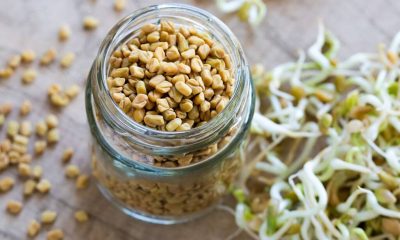Health
9 Benefits of kefir and side effects

Discover the 9 Health Benefits Of Consuming Kefir and side effects.
The health benefits of consuming kefir are abundant, it is a cultivated and creamy product with surprising attributes for the body.
Its refreshing, sour taste is similar to drinking yogurt but contains beneficial yeast and ‘probiotic’ bacteria found in yogurt
What is kefir?
Kefir is known to be a fermented drink made from kefir grains, specifically from the Caucasus mountains between Asia and Europe. The word ‘kefir’ originates from the Turkish word ‘keyif’, which means ‘to feel good.
Kefir grains contain several species of bacteria and yeast. They are small, yellowish-white in color with the appearance of miniature cauliflowers.
The history of kefir
Kefir has a very particular history that goes back a few centuries ago, were shepherds in the Caucasus mountains discovered that fresh milk transported in leather bags occasionally fermented into a fizzy drink.
In the Caucasus Mountains, legend has it that the resulting kefir grains (which are not a true grain) were a gift to the Orthodox to the Prophet Mohammed, who instructed them on how to use the grains.
Mohammed strictly forbade them to reveal the secret of Kefir Preparation to other people, or to pass kefir grains to anyone, because they would lose their “magic force.”
Legend explains why kefir grains and the method of preparing kefir have been shrouded in mystery for so long.
For most of recorded history, kefir was hardly known outside the Caucasus Mountains, although Marco Polo mentioned it when recounting his travels.
This self-carbonated dairy-based drink continues to be popular in Russia, Southeast Asia, and Eastern and Northern Europe and has recently gained some popularity in the United States.
Kefir production
The microorganisms and yeasts that are originally produced in kefir are adopted symbiotically to offer superior health benefits when ingested or consumed regularly.
This food is loaded with excellent vitamins and minerals, it already contains complete proteins that are easily digested and have natural antibiotic properties.
For those who are lactose intolerant, the abundance of yeast kefir and beneficial bacteria provides lactase, an enzyme that consumes most of the lactose that remains after the cultivation process.
Kefir can be made from any type of milk, cow, goat, or sheep, coconut, rice, or soy. Although it has a slightly mucous formation, the mucosa has a “clean” quality that creates the ideal conditions in the digestive tract for the colonization of friendly bacteria.
Kefir is made from white or yellow gelatinous particles commonly called “grains.” This makes kefir a unique food, as no other culture is known to give milk to form grains.
The grains have a combination of bacteria and yeast agglomerated with casein, which is the protein in milk, and also sugars.
The grains ferment the milk, incorporating their friendly organisms to create the cultivated product.
The grains are then removed with a strainer before consumption of the kefir and added to a new batch of milk.
Health benefits of Kefir
The health benefits of consuming kefir are considered a long-lived elixir.
This fermented drink from the Caucasian plains is true food medicine, packed with good bacteria, vitamins, and protein.
1.- Rich in vitamins and proteins
Kefir milk is as nutritious and complete as milk.
It includes protein, calcium, and B vitamins, including folic acid.
It allows you to vary dairy products and is as interesting for your health as milk or yogurt.
2.- Kefir protects our flora
The “good” bacteria present in kefir enrich our endogenous flora (the microbiota) and make it more resistant to pathogenic microorganisms. They play an immune barrier role.
Also, drinking this beverage can restore a balanced microbiota after taking antibiotics.
3.- Kefir is very digestible
Immersed in milk, kefir grains coagulate casein and convert lactose (milk sugar) into lactic acid, alcohol, and carbon dioxide.
The result is a creamy, white liquid whose consistency and flavor are reminiscent of whipped milk.
It is highly digestible, it can be consumed by lactose-intolerant people, allowing them to enjoy all the benefits of milk without its drawbacks (bloating, flatulence.)
4.- Strengthens immune defenses
Kefir contains many nutrients, such as biotin and folate, that boost the immune system and protect cells.
Contains a large number of probiotics, ideal for fighting germs.
One specific to kefir is called Lactobacillus kefir and it helps defend against bacteria such as salmonella and escherichia coli.
This bacterial strain protects the immune system and prevents the growth of many bacteria.
Kefir also has another potent compound that is only present only in this probiotic drink.
This is an insoluble polysaccharide called kefiran. Which is also an antimicrobial that manages to cure Candida fungus.
5.- Heals skin problems
The lactic acid content of kefir can inhibit the growth of acne-causing bacteria, while the lactic acid, peptides, and serum contained in kefir can lighten the skin
Skin lightening products can help reduce the appearance of birthmarks, moles, and lentigo spots to better suit the surrounding skin area.
This can also work with vitiligo. Some people also lighten their skin for general cosmetic reasons (this is common in Asia).
So if you want to clear up your skin or treat acne, kefir can help you achieve a more even skin tone and clearer skin overall.
6.- Kefir can protect you from cancer
Cancer is caused by cells in the body that mutate and grow in an uncontrolled way.
A tumor is an example of this. Studies have shown that the good microorganisms found in kefir can prevent the growth of tumors.
These probiotics can delay the enzymes that transform certain compounds into carcinogens in the body.
Kefir can also act as an antioxidant and support the immune system. Kefir has been tested for its role in the protection against colorectal cancer.
In test-tube studies, it has been found to stimulate the destruction of tumor cells. Kefir was also found to help stimulate cancer cell death in leukemia research
7.- Helps prevent osteoporosis
Osteoporosis is a condition characterized by low bone mass and a deterioration in the structure of bone tissue.
This can lead to brittle bones and an increased risk of fracture which is a global problem.
Osteoporosis affects more than 200 million people and is responsible for 1.5 million fractures
One of the most successful ways to maintain bone health and reduce the risk of osteoporosis is to get enough calcium.
Calcium is not the only nutrient that can help prevent osteoporosis. Vitamin K2 has been found to play a vital role in helping the body use calcium.
Making kefir with whole milk can increase the amount of vitamin K you eat and provide benefits to your bones.
Studies have found that kefir can improve bone mass and structure in postmenopausal women.
Therefore, although a glass of milk and a glass of dairy kefir may contain the same amount of calcium, kefir can improve bone health more than milk, they attribute this to kefir’s ability to increase the body’s absorption of calcium.
8.- Helps detoxify the body
In this modern age, toxins surround people, we consume it through food, and it is absorbed through cosmetics and other products.
Kefir can be used to detoxify the body. It is especially effective against aflatoxins. Aflatoxins are common toxins that we are exposed to in food.
They are spread through mold and tend to contaminate peanuts.
9.- Kefir can combat the effects of aging
Aging and age-related diseases are strongly linked to damage from oxidative stress.
Both the milk and kefir in soy milk are high in antioxidants, so much so that they may be among the most promising food components for preventing mutagenic and oxidative damage.
This means that they can help prevent several age-related diseases, such as cancer or dementia, and can also serve to extend lifespan. Consuming kefir can help slow down oxidative damage in the body.
Why is it good to drink kefir?
• Kefir is simple and inexpensive to make at home.
• is used therapeutically around the world to alleviate chronic fatigue syndrome
• because it works as a natural tranquilizer and antibiotic.
• Kefir is an excellent food for pregnant and lactating women, the elderly, and people with compromised immunity
Health
10 Benefits of charcoal soap and side effects

Table of Contents
Health
10 Benefits of long bell peppers

Discover the 10 health benefits of long bell peppers.
The long peppers may sound unfamiliar to some, but not in the ears of the Javanese. In Java, it is also known as Javanese pepper, with the scientific name of Piper Retrofractum Vahl.
It is considered as a spice and is commonly used for jamu, which is an Indonesian traditional herbal drink, hence its nickname is “cabe jamu” or jamu pepper.
If you want to learn more about long peppers, you are absolutely on the right track! For your information, long peppers grow at a maximum altitude of 600 m with 1,259 mm/year of rain. Anyway, what exactly is a long pepper?
Long peppers are also known as Balinese pepper or Indian pepper, following their original roots in South Asia, particularly India and Sri Lanka.
In India, long peppers are called ‘pippali’. Long peppers have four main functions, especially as a home remedy, cooking ingredient, medicinal herb, and catalyst to enhance the effects of other herbs.
The benefits of Javanese long peppers are somewhat similar to the health benefits of Indian long peppers.
Just as their scientific name suggests, long peppers contain piperine. Piperine is an alkaloid that works as a stimulant for poor blood circulation. Piperine is also found in black pepper and is also responsible for making both of them spicy.
Now here is the main question; Do long peppers have other uses besides being spices and a cooking ingredient? Yes, it does, and here are the health benefits of long pepper.
10 health benefits of long bell peppers
1.- Good for liver ailments
• Liver disease arises from our habit of indulging in unhealthy junk foods.
• At the end of the day, the liver becomes overworked.
• Long bell peppers balance the liver’s workload by removing toxins that have built up in the liver and that have been produced by digesting these types of foods.
• Here are also the best quick way to detox the liver after several years of drinking.
2.- Helps to lose weight
• The long pepper can burn fatty acids similar to other types of pepper without any side effects.
• In fact, it is considered a safer and healthier alternative compared to its clinical counterparts.
3.- Reduces the risk of diabetes
• Like the health benefits of red rice for diabetics, long bell peppers help alleviate diabetes by regulating the rate of glucose released into the blood system.
• Long peppers also stimulate insulin production.
• That is the main reason why long pepper is highly recommended for diabetic patients.
4.- Decreases bacterial infection
• The risk of bacterial infection may incline as the daily temperature increases.
• Unhygienic food, as well as unsterile water, can be prone to bacterial infection, causing an upset stomach.
• Long peppers can be used to counter these occurrences.
5.- Serves as a cough treatment
Long peppers treat a cough by making it a simple remedy. This is how you do it:
Step 1: Take 1 to 2 grams of the spice and fry it with a little ghee. Ghee is a kind of Indian butter.
Step 2: Bring it in while it cools.
If ghee is not available, you can use honey instead.
6.- Relieves indigestion
• The content of long peppers is capable of curing digestive problems.
7.- Decrease fever
• The antiseptic and antiseptic properties of long pepper can reduce fever or relax the throat.
• You can easily reduce a fever by mixing long pepper with a hot bowl of soup.
8.- Relieves toothache
• You can also cure a toothache by making a paste with pepper, salt, and water.
9.- Cure diarrhea
• Diarrhea can be cured by consuming a long pepper soup.
10.- Relieves asthma
• Long peppers are an alternative to relieve occasional asthma attacks and other asthma symptoms.
• However, you should not use it as a substitute for respiratory medicine.
How to use long peppers for traditional cures
About the previous pointers on the health benefits of long pepper, here are the simple recipes to make your long pepper remedy.
1.- To lower the fever
• Step 1 – Prepare 3g of dried long peppers
• Step 2 – Smooth until it reaches its softest state.
• Step 3: Infuse with hot water and consume.
• Despite its hot taste, it is suitable for both children and adults.
2.- It is a cure for toothache
• Step 1 – Prepare 3 long pepper leaves
• Step 2: squash them, but not to their smoothest shape.
• Step 3: prepare it in warm water
• Step 4: Use the gargle formula. Do it regularly until the toothache is completely gone.
3.- To overcome «Masuk Angin»
Masuk angin is an Indonesian term to describe the uneven distribution of gases within the body characterized by cold-like symptoms.
It has no direct translation into English, and no specific knowledge of this ‘disease’, therefore making ‘masuk angin’ is a large loose term. Long peppers can be treated ‘masuk angin’ by following this simple formula:
• Step 1 – Prepare 3g of long peppers, some brown sugar, ginger, and “temulawak” (Curcuma Zanthorrhiza).
• Step 2 – Boil until everything is softened and add warm water.
• Step 3 – Drink that formula while it’s still hot.
4.- Prevents abdominal spasm
• Step 1: Take 3 long pepper leaves and add a glass of water.
• Step 2: Boil both of them fully and let them cool for a while.
• Step 3: consume completely.
5.- Clean the postpartum ovary
• Step 1: Prepare 3 grams of long pepper roots.
• Step 2: Add warm water and bring to a full boil.
• Step 3 – Filter the water when you are done.
• Step 4: Consume the boiled water until done. It is suggested to consume it while it is still hot.
Those are just the healthy creations you can make with long bell peppers. The recipes are not proprietary so you can easily adjust them to better suit your preferences or requirements.
However, it is still highly recommended that you follow exactly what is written above. In addition to the long bell pepper uses listed above, there will be more below, however, the ones below are not specifically categorized by disease.
Generic long pepper recipe
Step 1 – Boil 150cc of water.
• Step 2 – Make it with 4 grams of pepper powder.
• Step 3: Consume while hot to get your maximum benefit.
If there are still long pepper powders left, you can also use them like this:
• Fill it inside the capsules for consumption at any time.
• Apply the powders directly to the affected area for toothache.
• Use it to treat swollen gums.
• In addition to health, long peppers are equally useful for planting and soil fertility.
• Thirty-eight uses of long peppers can be obtained by using them in a “jamu” or a traditional herbal drink, which has the potential to cure practically everything but the insecticide.
• Long pepper does not work with insecticide because it kills the reaction of the insecticide inside the plants.
Those are just the top long pepper health benefits that may sound unfamiliar to you, especially among the youngest these days. Either way, hope it helps!
Health
Ozempic for weight loss

Table of Contents
-

 Benefits4 months ago
Benefits4 months agoThe Benefits of Joining Gym Lumolog – Improve Your Fitness & Health
-

 Food1 year ago
Food1 year ago10 + Benefits of carrot juice and side effects
-

 Health1 year ago
Health1 year ago50 Super Healthy (And Very Often Cheap) Foods
-

 Health1 year ago
Health1 year ago5 Shocking health benefits of kinkeliba and side effects
-

 Food1 year ago
Food1 year ago8 shocking benefits of leek juice and side effects
-

 Health1 year ago
Health1 year agoBenefits of guava leaves Sensually
-

 Health1 year ago
Health1 year ago15 Benefits of lipton tea and side effects
-

 Weight Loss1 year ago
Weight Loss1 year agoChaz Bono weight loss secret












